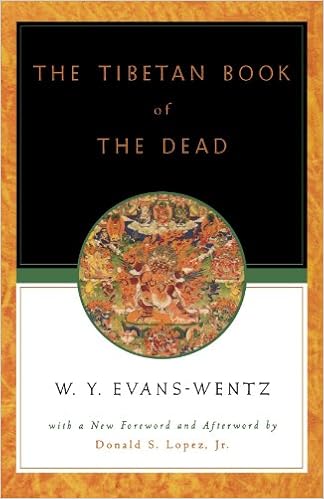Despite the book's somewhat questionable origins, I found the content to be beneficial, even essential, for my own esoteric studies and for those interested in expanding their own understanding of the ancient teachings, mainly when talking about Eastern esotericism, of course. There is a lot of commentary in the book, but the deliberations are fascinating and vital if you're going to try to understand the book's deeper concepts.
Essentially, when you die, you enter another state of consciousness. Everything you see and experience in the afterlife appears real, but--like a dream--the only genuine reality hides behind the myriad of illusions you confront. If you train yourself in this state of consciousness, the life you're living right now, and discipline yourself in the esoteric lore that has survived the ages, when you die, you'll find the path to Absolute Freedom. There are many names for this Truth, so I use more generic references. Some call it Love, others call it God, and--of course--there's the title Nirvana.
Without a guide to help direct you to the great light of truth, you are very likely to interpret an illusion as reality or you might simply succumb to the desires which those illusions instill. Perhaps you have unfinished business on this plane of existence. Maybe you still want to experience sex more, have a family, or help people. Maybe you died unexpectedly and you're confused and want to return to those you knew. Maybe you're angry and want to punish the world you felt treated you terribly. Regardless of what motivation overcomes you, the illusions will alter and intensify accordingly and create images you will mistake as being real and necessary to gravitate towards or runaway from--aimlessly even, until you're hopelessly lost. Thus, you are reborn.
Although the text seems to indicate that the training process is relatively simple, I'm convinced that it takes multiple lifetimes to really train your consciousness to know what to remember and what to do in the afterlife to avoid rebirth. Another name for this forgetfulness is afterlife retrogression. Many experience it, and--alas--many are reincarnated, their past decisions determining their future circumstances in the next life.
What this book does is begin the long-long-long journey towards natural transmutation. Your body is a temple, the greatest Great Pyramid ever built. Every body you inhabit is equally grand. Without True Education, though, the pyramid remains vacant, unused. It becomes a tomb. If you open the doors to the tomb and rise again to hear the Word, you might learn the path to true salvation. Does any of this rhetoric sound familiar? Everywhere the teachings of Eastern and Western ideologies blend, but the Tibetan Book of the Dead clarifies what is basically important in this life: avoid afterlife retrogression, break the cycle of necessity, and become One.
For a greater appreciation of these concepts, I recommend the writings of Manly Hall (namely "Death to Rebirth: Five Essays by Manly Hall"), a translation of the Corpus titled The Way of Hermes, Jewish mystic teachings found in the Bahir and the Sefer Yetzirah, Platonic and Neoplatonic philosophy that can be found in the Dialogues and The Enneads, and, of course, the Egyptian Book of the Dead.

No comments:
Post a Comment